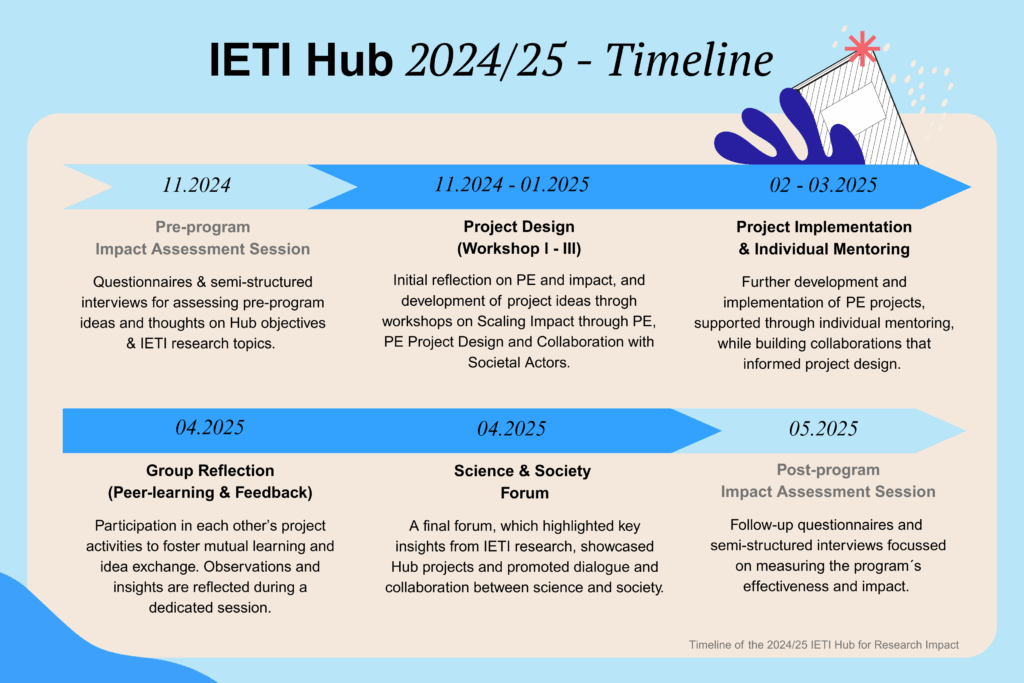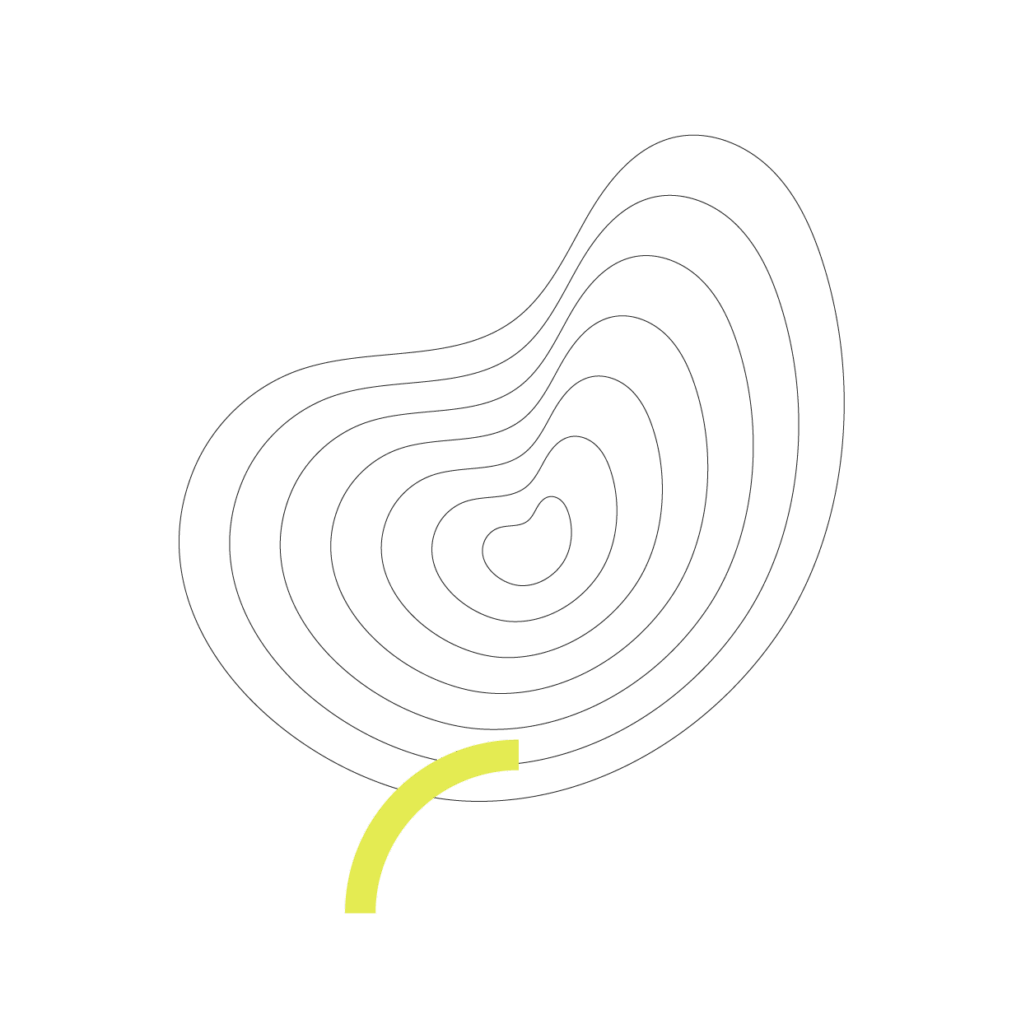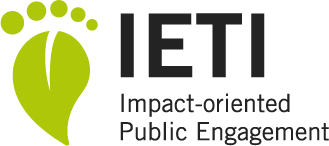IETI HUB
for Research
Impact

In November 2024 we launched the IETI Hub for Research Impact in collaboration with the Berlin School of Public Engagement and Open Science.
The Hub, a six-month capacity building, mentoring and support programme for researchers and professionals at the Museum für Naturkunde Berlin (MfN), focused on integrating impact-oriented Public Engagement into their work. Through workshops, mentoring, hands-on project development, and peer learning sessions, participants gained practical skills in designing innovative, mutually beneficial approaches to science-society engagement, along with impact planning and evaluation. The programme also offered incentives such as seed funding, certificates of completion, and opportunities to promote the work of Hub participants. All projects were presented in a final Science Society Forum.
The Hub was part of an action research process, building on IETI research on experiences, motivations, barriers and needs related to practicing PE at the MfN. Its effectiveness was evaluated through pre- and post-programme Impact Assessment Sessions. In line with the Museum’s mission to “discover and describe life and earth – with people, through dialogue,” the Hub promotes the mindset that both research and society benefit from mutual exchange. To this end, it offers a space for reflection, collaboration, and experimentation.


Impact Assessment Sessions
To assess the effectiveness and impact of the IETI Hub for Research Impact, we conducted pre- (22.11.24) and post (05.05.25) programme Impact Assessment Sessions with Hub participants. These sessions were held once before the programme began and once after its completion, aiming to capture changes in participants understanding of PE through participation in the programme. Thereby, we used a mixed-method approach combining semi-structured interviews and questionnaires to gather both qualitative and quantitative insights.

● The questionnaire was designed to capture participants’ perspectives on (1) benefits of participating in the IETI Hub, and (2) reflection on MfN’s current support for Public Engagement using the EDGE tool.
● The interviews explored Hub participants’ perspectives on (1) the impact of their work, (2) the role of Public Engagement in research, and (3) the effectiveness of the program’s support measures – particularly in relation to the funding provided, time management strategies, participatory and innovative methods, professional development, mentoring and opportunities for networking and collaboration.
The sessions provided valuable insights into the Hub’s role in promoting PE as a pathway to research impact, integrating PE into daily work routines, and fostering participatory, co-creative, and innovative practices between science and society. The results confirmed that the programme effectively built participants’ skills in impact-oriented public engagement and supported a culture shift toward embedding impact frameworks and PE into research and professional practices. Participants reported significant gains in competence, confidence, professional development, and network expansion, as well as the successful development of mutually beneficial projects. They highlighted the importance of collaboration and co-creation with societal actors as key to project development, implementation, and long-term sustainability beyond the Hub programme. Mentoring support further strengthened participants’ commitment and enhanced the quality and impact of their projects. The programme’s structure and clear timelines provided a strong framework for managing expectations and allocating time effectively. The seed funding provided was instrumental in maximising project quality.
The post-impact assessment session completed a crucial loop in our action research methodology, offering a clearer understanding of how programmes like the IETI Hub for Research Impact can foster meaningful, impact-driven interaction between science and society.
Workshops
A key element of the IETI Hub’s capacity-building strategy was a series of workshops through which participants gained practical skills in impact management and PE project design, as well as collaboration with societal actors. Over the course of three months, participants developed initial PE project ideas, applying and experimenting with participatory, co-creation and innovative methodologies, as well as strategies aimed at creating mutually beneficial outcomes for science and society.

Workshop I: Scaling Impact through PE
28.11.2024
Hub participants explored the role of PE in scaling the impact of their work, while reflecting on strategies for impact planning and evaluation. The workshop was delivered in three parts, all focussing on different aspects of impact and PE.
Workshop II: PE Project Design
10.12.2024
Hub participants developed impactful PE projects tailored to target groups by applying Design Thinking and Business
Model Canvas methodologies to strengthen project impact.
Workshop III: Collaboration with Societal Actors
28.01.2025
Hub participants networked and exchanged with museum colleagues, PE professionals and societal actors from
diverse fields to discuss their project ideas and explore opportunities for mutually beneficial collaboration and
co-creation. The workshop was held in the form of a World Café, fostering interdisciplinary exchange, innovation and
creativity within a community dedicated to creating lasting impact in both academia and the broader societal sphere.

Project Implementation & Individual Mentoring
During three months, IETI Hub participants implemented their projects while actively building collaborations that informed their PE project development. The projects shared a deep commitment to making science more open, engaging, and meaningful for diverse target groups.

Through creative approaches that combined community learning, emotional storytelling, hands-on exploration, and citizen science, they fostered stronger connections between people and nature. Whether by inviting participation across generations, amplifying underrepresented voices, or encouraging sensory and reflective experiences, each initiative showcased how science can resonate with everyday life and societal needs. Collectively, they highlighted the transformative potential of collaboration and mutual exchange between science and society.
Throughout their journeys, participants received mentoring support to guide project design and implementation. Four tailored mentoring sessions focused on impact management, budget planning, and fostering collaboration with target groups. Emphasis was placed on addressing the needs of these groups while creating mutual value. We explored how project activities could build on each other to strengthen outcomes. Additionally, mentees revisited their impact planning and assessment strategies to ensure their activities aligned with their intended goals and to identify effective methods for measuring impact.
Group Reflection & Peer Learning
In addition to the peer learning and group reflection sessions integrated into the Hub’s workshops, supplementary sessions were held to foster mutual learning, co-development of project ideas, and collective reflection on the IETI Hub journey.
A dedicated session in January 2025 allowed participants to share their evolving projects using the Project Canvas from Workshop II, highlighting key ideas, challenges, and open questions from the ideation phase. Through collaborative dialogue, they exchanged feedback and supported one another in refining their approaches.

Another reflection session was held in April 2025 during the final implementation phase. It focused on participants’ Public Engagement journeys – from planning to execution – allowing participants to share lessons learned and engage in structured feedback to support continued growth and impact.
Science & Society Forum
The Science & Society Forum, held on 29 April 2025 at the Museum für Naturkunde Berlin, marked the closing event of the IETI Hub programme. It brought together professionals from the MfN and a diverse range of societal actors – from public engagement and research to policy, education, media, and the arts – fostering dialogue and collaboration between science and society, and providing a platform to exchange ideas on the role of PE in enhancing research impact.

The forum highlighted key insights from IETI research and showcased the five public engagement projects developed within the IETI Hub. Participants gained valuable perspectives on designing and implementing impact-oriented public engagement, and took part in vibrant discussions on collaboration, knowledge exchange, and long-term impact. The event also served as a platform to connect with a growing community dedicated to bridging science and society through meaningful engagement.

